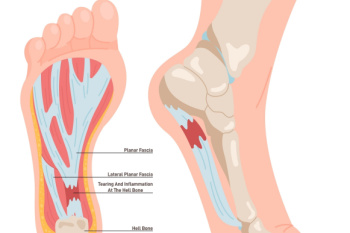Key Insights Into Foot Pain From Plantar Fasciitis
Tuesday, 20 February 2024 00:00
Plantar fasciitis, a common foot ailment, affects millions of individuals worldwide, causing discomfort and hindering mobility. This condition occurs when the plantar fascia, a thick band of tissue connecting the heel bone to the toes, becomes inflamed or strained. It is characterized by sharp pain at the bottom of the foot, particularly near the heel, especially noticeable during the first steps in the morning or after prolonged periods of rest. While the exact cause remains elusive, factors such as overuse, improper footwear, high-impact activities, and tight calf muscles contribute to its onset. Plantar fasciitis is prevalent among athletes, runners, and individuals who spend extended periods on their feet. Fortunately, conservative treatments like rest, stretching exercises, and orthotic inserts, can alleviate symptoms and promote healing in many cases. However, persistent cases may require medical intervention, including corticosteroid injections or surgical procedures. If you have heel pain, it is suggested that you confer with a podiatrist who can accurately diagnose and treat plantar fasciitis.
Plantar fasciitis can be very painful and inconvenient. If you are experiencing heel pain or symptoms of plantar fasciitis, contact Dawn Miles, DPM from Florida. Our doctor can provide the care you need to keep you pain-free and on your feet.
What Is Plantar Fasciitis?
Plantar fasciitis is the inflammation of the thick band of tissue that runs along the bottom of your foot, known as the plantar fascia, and causes mild to severe heel pain.
What Causes Plantar Fasciitis?
- Excessive running
- Non-supportive shoes
- Overpronation
- Repeated stretching and tearing of the plantar fascia
How Can It Be Treated?
- Conservative measures – anti-inflammatories, ice packs, stretching exercises, physical therapy, orthotic devices
- Shockwave therapy – sound waves are sent to the affected area to facilitate healing and are usually used for chronic cases of plantar fasciitis
- Surgery – usually only used as a last resort when all else fails. The plantar fascia can be surgically detached from the heel
While very treatable, plantar fasciitis is definitely not something that should be ignored. Especially in severe cases, speaking to your doctor right away is highly recommended to avoid complications and severe heel pain. Your podiatrist can work with you to provide the appropriate treatment options tailored to your condition.
If you have any questions please feel free to contact one of our offices located in Palatka and Saint Augustine, FL . We offer the newest diagnostic and treatment technologies for all your foot and ankle needs.









